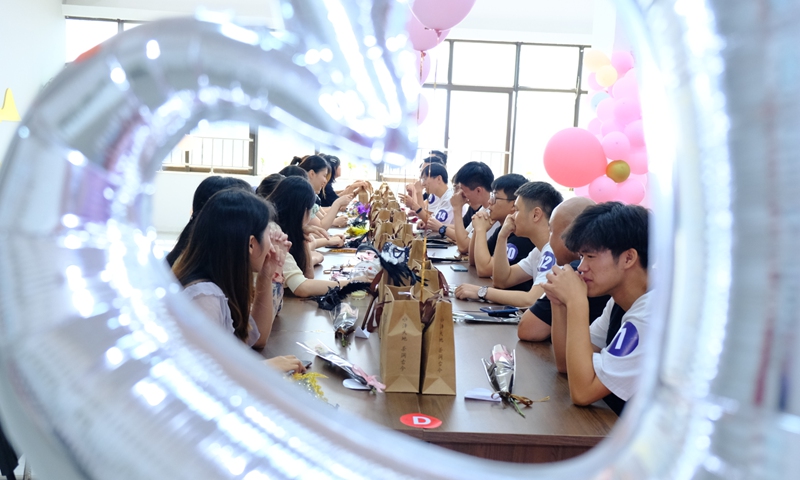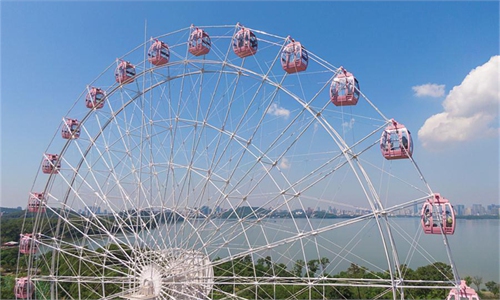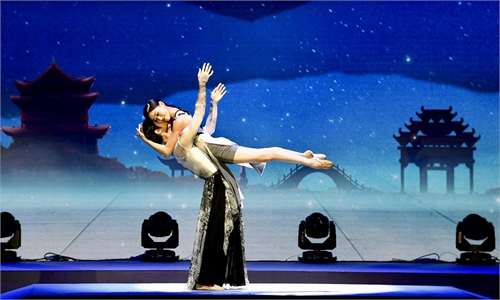Luxury brands embrace Chinese Valentine’s Day
Special-edition collections launched to create ‘emotional connection’ with consumers

Young people at a Qixi matchmaking event in Hefei, East China's Anhui Province in August 2020
As China's Valentine's Day of Qixi approaches, a laundry list of luxury brands has launched a series of special-edition collections for the festival, turning this romantic festival into new fierce battleground for the luxury sector.
In light of a recovering economy and a spending rebound with people being unable to travel abroad, some industry insiders pointed out that China is on track to become the global central market for luxury consumption in the next few years, with global luxury brands increasingly sparing no efforts to cater to the Chinese aesthetic to win the heart of local consumers.
The campaign for Qixi, which falls on August 14 this year, rolled into action a month ago - much earlier than usual. Promotions, ads and marketing campaigns are all-rounded, covering both online channels such as e-commerce platforms, Wechat mini programs and social media as well as brick-and-mortar stores.
Inspired by the phase "apple of my eye," Gucci introduced the apple print collection for Chinese Valentine's Day in July. The collection reinterpreted Gucci's signature GG logo into a motif featuring a red apple and the special series include handbags, accessories and clothing.
The company also launched a campaign on social networking platform Little Red Book, inspiring users to post selfies with Gucci's wall advertisement in cities like Shanghai and Shenzhen, South China's Guangdong Province.
Another luxury brand Dior leveraged celebrity influence, working with the brand's ambassadors including actress Angelababy and Yang Caiyu to promote its love-themed "Dioramour" collection on Chinese social media platforms. The limited-edition collection includes bags, accessories, shoes, ready-to-wear and home products.
As part of the Qixi campaign, Dior also opened pop-up stores in Shenzhen and Nanjing, East China's Jiangsu Province. It also opened "Dioramour Cafés" in Shanghai and Xi'an, Northwest China's Shaanxi Province, to further generate buzz for the brand around the country, the Jing Daily reported.
Launching a jointly-designed limited collection is another way for luxury companies to raise excitement among younger consumers.
For example, Fendi collaborated with British artist Mr Doodle - Sam Cox - to launch a limited collection for China's Valentine's Day featuring the artist's detailed doodles, according to the Jing Daily report. Givenchy also works with airbrush artist Chito, blending revisited icons and new favorites in a fresh color palette in its exclusive capsule collection for Qixi, according to an introduction on the brand's website.
Catering to Chinese consumers
This year, go-to-market strategy for global luxury brands is shifting to online platforms such as e-commerce platforms and Wechat mini programs, which has about 600 million users.
In July, 12 luxury watch brands including Longines, Vacheron Constantin, Jaeger-LeCoultre and IWC have released 500 special new collection for Qixi on e-commerce platform Tmall. Vacheron Constantin also announced that it will launch an online VIP customer service on Qixi, helping consumers form understanding about Qixi new watches. Consumers who purchase limited-edition watches also are entitled to enjoy a luxury delivery service: with items delivered by luxury cars and service personnel wearing white gloves.
Saint Laurent, among one of the first group of luxury brands to debut Qixi campaign in early July, allows consumers to book a customized service, which involves printing names on its logo hoodie, on Wechat mini programs and boutiques. On Tuesday, Prada also released its exclusive collection for Qixi on the brand's Wechat mini programs and official site.
"The online drives target at young Chinese consumers, who are more buying into marketing and sales campaign online, which gives them feeling of vibrancy," Wang Xinmiao, a manager at a Beijing-based advertisement company, told the Global Times on Wednesday.
Millennials aged between 20 and 34 are now the main force fueling the expansion of China's luxury market, with online channels accounting for over half of the information they receive about luxury brands, research report showed.
According to Wang, one reason behind the explosive promotions for Qixi is that many luxury brands regarded the traditional festival as a great opportunity to establish "emotional connection" with Chinese consumers through their unique interpretations.
In fact, in addition to Qixi, more and more luxury brands are also celebrating traditional Chinese festivals like the Lunar New year and 520, another Chinese version of Valentine's Day as its pronunciation sounds similar to "I love you" in Chinese, which industry observers said underscores how luxury brands are increasingly placing their biggest bets on China, where consumption is quickly rebounding along with the steady recovery of the economy in post-virus era.
Rising demand
Simon Williamson, chief merchant at value retail of Bicester Village in Shanghai, located at Pudong New Area, said that compared with 2019, the village's sales have recorded triple digit growth in 2020 - a vivid display on the huge potential of China's luxury consumption. Also, the average spending of a consumer shopping in the village has grown by more than 30 percent year-on-year to date this year.
The village, which opened in 2016 and located near Shanghai's Disneyland theme park, now boasts more than 200 boutiques both from world class international design and from emerging Chinese brands. Also, over 50 luxury stores have opened recently after the epidemic eased, with 40 of them making debut in the Chinese market.
Williamson stressed that China has now become the central global market for luxury consumption, and even consumption in general. One of the boosting factors is that "Chinese consumers who normally shopped abroad are now actually shopping domestically. And the situation will continue to grow through the rest of the year and certainly in 2022," Williamson told the Global Times.
China's massive spending power is set to be further on display throughout the second half year with the country's dual circulation strategy which prioritizes both markets at home and abroad, industry insiders said.
In July, China's Ministry of Commerce announced that Beijing and Shanghai, along with other three cities, will be the first group of cities to be designated as international consumption centers.
According to a report issued by Bain & Company, China's share of the world luxury goods market nearly doubled last year, growing from about 11 percent in 2019 to 20 percent in 2020, while the global luxury market declined at a forecast rate of 23 percent in 2020, the report showed.


